Turkey's president Erdogan bluffed Trump out of Syria. Now what does he want?
BARCELONA — This week, when he’s starring on the world stage as a militant monster, it’s hard to recall that President Recep Tayyip Erdogan, who’s led Turkey for the past 16 years, was not long ago lauded and credited with doing more than anyone else to democratize his country. This week, everyone from Sen. Lindsey Graham to German Chancellor Angela Merkel is condemning him and Turkey’s bloody incursion into northeastern Syria, widely regarded as the beginning of a systematic ethnic cleansing of Kurds.
And Erdogan stood his ground, initially refusing to meet with Vice President Mike Pence and U.S. Secretary of State Mike Pompeo, who were dispatched to Ankara to demand a cease-fire. “I will not meet with them,” Erdogan reportedly told Sky News. “I will speak when Trump comes.” Shortly afterward, his office seemed to reverse that stance and agreed to a meeting — but gave no sign he would pull back his army.
Erdogan has long fumed that Kurds were building a de facto nation in the northeast corner of Syria, which he doesn’t want to extend into his own country, whose population is around 18 percent Kurdish. Beyond creating a secure border zone for Turkey, Erdogan explains one of the goals of his Operation Peace Spring is to relocate a third or more of the 3.6 million refugees that Turkey has taken in since the start of the Syrian civil war in 2011 — for which, incidentally, it has been reimbursed billions of dollars by the European Union.
“Nationalist,” “authoritarian,” “Islamist” — Erdogan in recent years has been called all of these things, not without justification. But he is also a canny politician who by all signs took the measure of President Trump in a one-on-one phone call last week, persuading the American president to pull back the U.S. force stationed along the Syria-Turkey border. That opened the door to Turkey’s invasion, and economic and political retaliation by a White House that apparently hadn’t thought through the consequences of Trump’s casual acquiescence. Whether Erdogan has overreached this time will have enormous consequences not just for his country, but for the entire Mideast — not to mention Europe and the rest of the Western world.
“Does he believe he can actually do it?” Hannah Lucinda Smith, author of “Erdogan Rising,” speculated to Yahoo News about Erdogan’s ambitious plan to resettle a million Syrian refugees back across the border into the area from which the Kurds are now fleeing. She suspects the plan is for domestic consumption, meant to solidify Erdogan’s image as “the one protecting Turkey from nefarious powers.” It’s an idea that is proving popular with Turks, who are getting tired of housing the refugees and have been struggling economically.
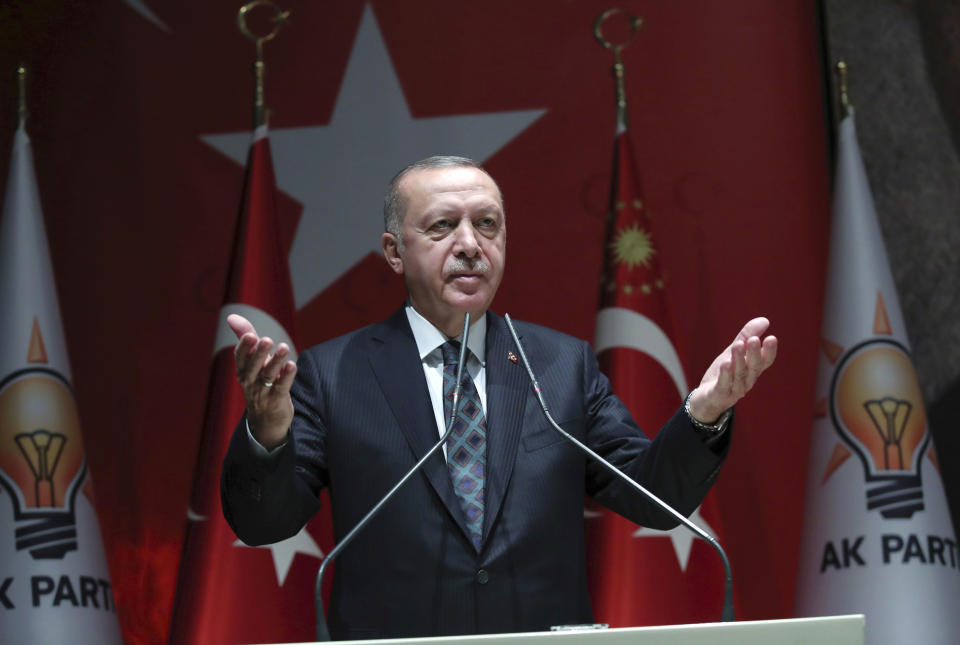
Meanwhile, Erdogan managed in just a week to alienate the Trump administration, which sent Pence to Ankara on Wednesday to tell the Turkish president to “stand down, end the violence and come to the negotiating table.” Even Trump himself is now castigating the leader he is scheduled to meet on Nov. 13. On Monday, Trump called for a cease-fire, announced he was suspending negotiations on a $100 billion trade deal with Turkey, and promised personal sanctions on Turkish officials and a draconian tariff of 50 percent on Turkish steel. “I am fully prepared to swiftly destroy Turkey’s economy if Turkish leaders continue down this dangerous and destructive path,” the president said, while washing his hands of a matter he seemed to regard as someone else’s problem. Anybody who’s interested in stepping up to help protect the Kurds, he tweeted, “is good with me, whether it is Russia, China, or Napoleon Bonaparte. I hope they all do great, we are 7,000 miles away!”
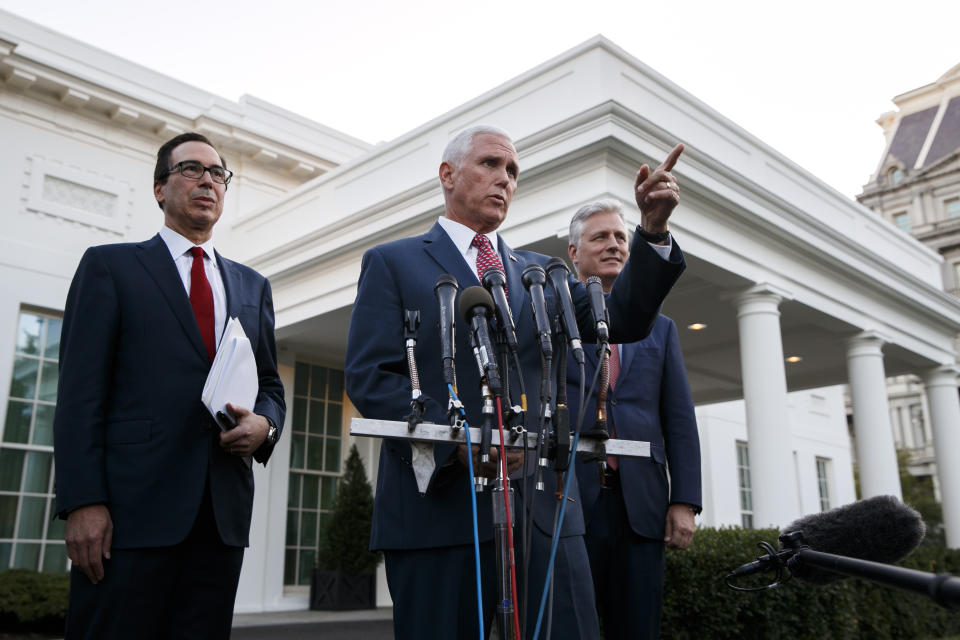
Erdogan, who previously described the American president as “my dear friend Donald,” has had a twisted relationship with the Trump administration from the start, complicated by the presence in the United States of Fethullah Gülen, who has lived in the U.S. since the 1990s. Gülen is an extremely influential Turkish-born Muslim cleric who heads an international movement that Erdogan regards as a political threat — and whom he blames for inciting a coup that almost toppled his government in 2016. Trump’s first head of the National Security Council, Michael Flynn, ran a consulting firm that had been paid $530,000 by a group linked to Erdogan to investigate and vilify Gülen, described by Flynn in an op-ed for The Hill as “a shady Islamic mullah.” In September 2016, Flynn met with Erdogan’s son-in-law, allegedly to discuss a plot to kidnap Gülen from his compound in Pennsylvania. Flynn reportedly would have been paid $15 million to deliver Gülen to an island prison in Turkey. Rudy Giuliani also reportedly obsessively lobbied Trump to extradite the cleric.
Other irritants have mounted. During Erdogan’s May 2017 visit to the White House, his security detail beat up protesters outside the Turkish Embassy — a lapse, not to mention a crime, that the Trump White House did not publicly condemn. Turkey’s detention of American pastor Andrew Brunson, charged with supporting Gülen and Kurdish separatists, became a cause célèbre with American evangelicals, who persuaded Trump to retaliate with sanctions and painful tariffs on Turkish steel that exacerbated Turkey’s economic woes: the value of the Turkish lira plummeted last summer by nearly 40 percent, leading to inflation, escalating food prices and growing unemployment, which reached 13 percent in June.
Erdogan capitulated and released Brunson to a hero’s welcome at the White House in October 2018, but suspicion between the two leaders lingered. And even those evangelical leaders, who had been among Trump’s staunchest supporters and applauded his efforts with Brunson, were loudly critical of what they characterized as his “betrayal” of the Kurds last week.
But the man being portrayed as a brutal bully was not long ago lauded as a visionary and a liberalizing force in Turkey. The son of a ferryboat captain, Erdogan, charismatic and driven, rose from the working class to become mayor of Turkey’s largest city, Istanbul, from 1994 to 1998, during which he demonstrated a pragmatic, progressive approach, introducing citywide recycling and renovating the water supply system. Founding the Justice and Development Party in 2002, he promised to modernize, democratize, to develop public works projects and to crack down on corruption. Brandishing his wedding band, which he claimed was his only wealth in the world, he reportedly said: “Look at this ring. If you hear one day Erdogan became rich, know that there is something wrong.”
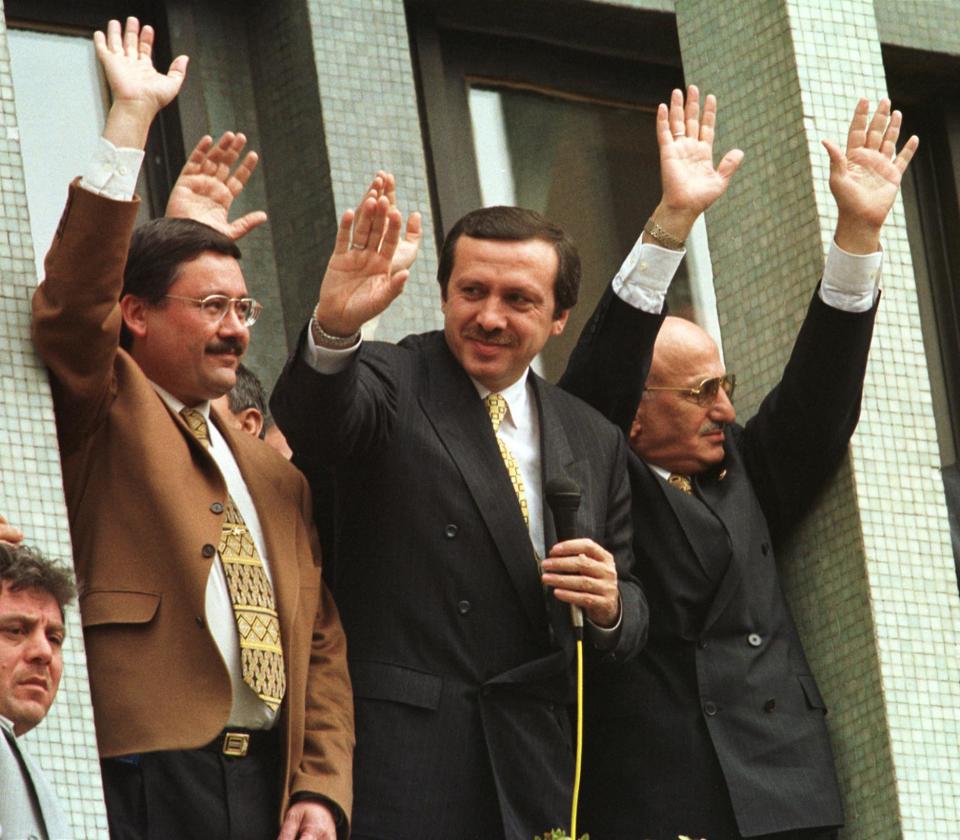
When elected as Turkish prime minister in 2003, Erdogan embarked on major construction projects — bridges, luxury condos, malls and a new 1,100-room, story-story, three-building palace compound for himself, leading the economy to expand at a torrid 7 to 8 percent annual rate. Wages shot up — the average worker’s income soon nearly tripling to $10,000 a year — and, seeking to join the European Union, he did away with Turkey’s death penalty and allowed Kurdish radio broadcasts for the first time. He later opened up talks with the Kurdistan Workers’ Party — the PKK — which has been targeting the government since 1984 in a guerrilla war that has killed some 40,000 on both sides.
But his projects got more grandiose, and his government became more authoritarian and religious. Musicians and writers were arrested for insulting Islam; controversial plans were drawn up for a towering Istanbul mosque with 30-story minarets; alcohol was banned on college campuses; and the government began measures to curtail or end abortion. In 2013, protests against a government plan to develop an Istanbul park as a shopping center led to riots in which eight people died.
That same year, Erdogan faced a corruption scandal that nearly toppled him. Without his knowledge, his government’s anticorruption unit was wiretapping his son Bilal in a money-laundering investigation involving smuggled Iranian gold. In one conversation, it taped Erdogan telling Bilal to move money hidden in their villa, reportedly in the millions. Other investigations focused on the sons of Cabinet members, who eventually resigned. Erdogan fought back, claiming the tapes were faked to incite a coup by followers of Gülen, who until then had been an ally.
He purged the anticorruption unit, the police and the judicial system of officials suspected of supporting Gülen, and when the purported wiretapping tapes appeared on social media, he tried to ban YouTube, Twitter and Facebook.
In 2014, the year that the U.S. began supporting Kurdish fighters in Syria as allies in the fight against the Islamic State group — a move opposed by Turkey — Erdogan formed a coalition with a nationalist party. The following year he ended a three-year cease-fire with the Kurdish militia associated with the PKK. As the Syrian civil war expanded and refugees poured across the border, Erdogan made a deal with the European Union to subsidize Turkey’s housing for them, to the tune of around $3 billion so far. Erdogan has been complaining about it ever since, saying the money isn’t enough, and threatening simply to “open the doors of Europe” and let the refugees run there.
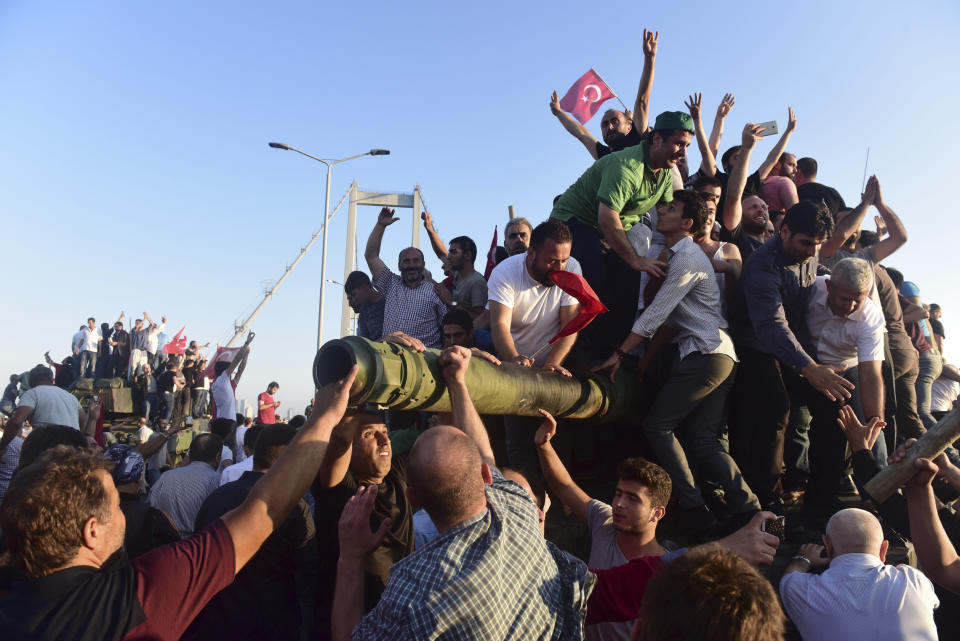
On July 15, 2016, while the president was in the countryside on vacation, tanks began rolling across the Bosphorus Bridge into Istanbul. The military, which has enacted four successful coups since 1960, was attempting to overthrow Erdogan. His supporters — estimated to number about half the population — fought them through the night, and in the skirmishes, more than 2,000 were injured and 265 were killed, among them Erdogan’s best friend. Erdogan’s forces gained the upper hand within a day, and, using emergency powers, he began rounding up perceived enemies by the tens of thousands, an estimated third of the military’s top brass, journalists and anyone he believed was a supporter of Gülen. In its 2019 report on Turkey, Human Rights Watch reported that over 130,000 public officials were fired in the post-coup fallout, and some 49,000 Turks — about a fifth of the prison population — are still incarcerated on terrorism charges, including large numbers of teachers and judges.
And shortly thereafter, Erdogan ordered his first incursion into Syria, first striking near Aleppo, followed by an operation in Afrin, a Kurdish town in northern Syria.
Smith, the author of “Erdogan Rising,” believes that 2016 incursion was mostly to demonstrate the president’s control of the country’s powerful army, whose commanders had opposed putting boots on the ground in Syria. That year, when Kurdish militants bombed security forces outside an Istanbul football stadium, the fourth attack that year by a guerrilla force known as the Kurdistan Freedom Falcons, Erdogan intensified his arrests of Kurdish politicians. By some estimates, thousands of members of the pro-Kurdish political party are behind bars. And thousands more Turks have been arrested on the grounds of offending the increasingly thin-skinned leader, among them a former Miss Turkey.
Smith says that the most recent Turkish incursion, this time into northeast Syria, a Kurdish stronghold, is Erdogan’s attempt to “galvanize domestic support.” With Turkey’s economy still wobbling, his popularity is declining, and in municipal elections this spring his party lost control of Turkey’s main cities for the first time in 25 years. More alarming to Erdogan: Top members of his party are defecting, including two who have vowed to start rival parties. “This operation allows Erdogan to take control of the narrative,” Smith says, noting that nobody’s talking about the new parties anymore. “When this is all done and dusted, however it turns out, we’ll see Erdogan onstage touting it as another victory for him.”
She’s not alone in interpreting these moves as a bid for a full-on dictatorship with a lifelong president. “Democracy,” as Erdogan once said, “is like a streetcar you ride until you reach your destination.”
Smith added, “He knows at this point, if he’s not president, he could face a raft of charges” — an observation that has also been made about another president whose hold on office suddenly seems a little shaky.
Melissa Rossi is a U.S. journalist based in Spain.
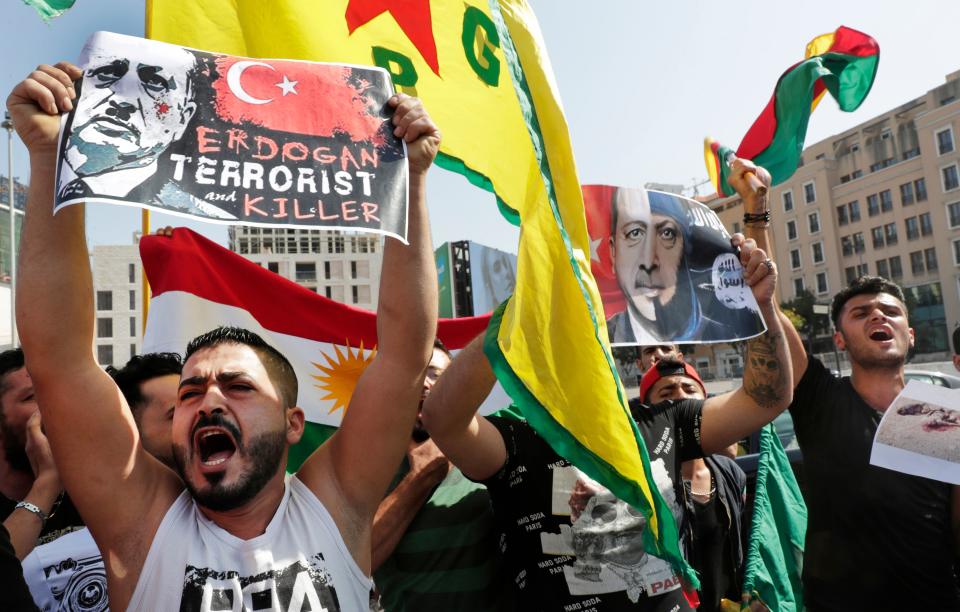
_____
Download the Yahoo News app to customize your experience.
Read more from Yahoo News:
Greta Thunberg: Powerful men 'want to silence' young climate activists
Driven from Central America by gangs and finding refuge in Kentucky: One woman's story
'I talk about power because you're not supposed to': Why Stacey Abrams still wants to be president
Nation's intelligence officers are resigned to serving a president who doesn't trust them
Before Black Lives Matter: Exhibition pays tribute to an earlier NYPD killing of unarmed black man
360: U.S. pulls support for Syrian Kurds: What happens next?
PHOTOS: In monochrome — Venezuelan fishermen among oil ruins

